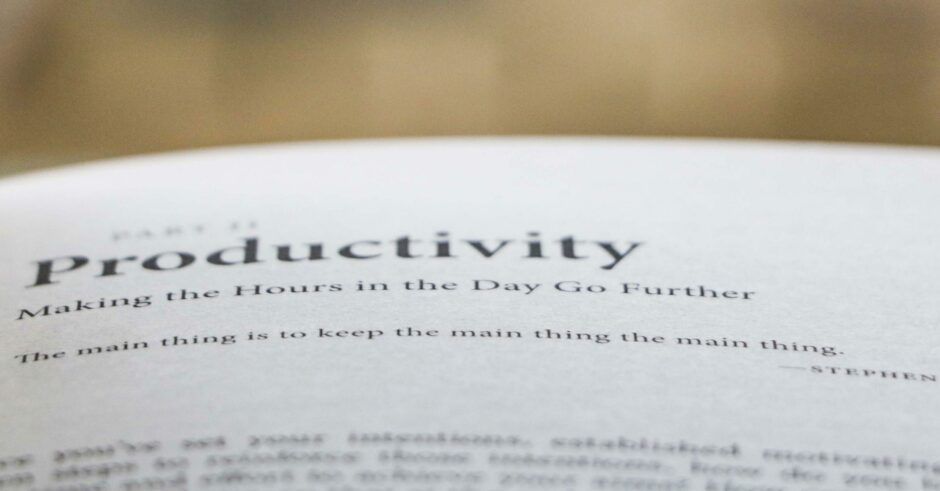The graph above, too small to read, shows productivity in the OECD 2007 using GDP per hour worked. Source OECD StatExtracts. It shows we in the UK are 11th.
Wikipedia says labour productivity, is used by many as an indicator of economic growth and competitiveness.

The HBR says, “At its most basic, productivity is the amount of value produced divided by the amount of cost (or time) required to do so.”
With a new law barring work e-mail after hours, the French have honoured a truth long recognized by economists: working longer hours doesn’t necessarily result in increased productivity. Mexico—the least productive of the 38 countries listed in 2015 data from the Organization for Economic Cooperation and Development (OECD)—has the world’s longest average workweek at 41.2 hours (including full-time and part-time workers). At the other end of the spectrum, Luxembourg, the most productive country, has an average workweek of just 29 hours. Time Magazine, David Johnson, 4 Jan 2017
Expert Market published that in 2017 the UK was ranked 17th in productivity behind countries like Australia, Ireland, the USA, Luxembourg, France etc
Three years ago the Guardian wrote; UK productivity gap widens to the worst level since records began. Growing gulf means UK workers produce significantly less per hour than G7 average Germany. Photograph: U Baumgarten/Getty
Britain’s poor productivity record has been highlighted by government figures showing the biggest gap with other leading western economies since modern records began in the early 1990s.
Output per hour worked in the UK was 18 percentage points below the average for the remaining six members of the G7 group of industrial nations in 2014, the Office for National Statistics said.
Before the statisticians and or economists pick elements of my data apart, it seems that whatever measure you use and whichever source you quote, our productivity does not mirror the developed world we aspire to be.
So whilst we might celebrate recent wins on flexible working, and devote heaven only knows how much energy to creating a niche employee representative group for every conceivable difference (ironically in my view re-enforcing difference rather than inclusivity), and whilst engagement levels appear to be a challenge for many, we continue to be unproductive on the Global stage.
In essence, this creates a lose-lose scenario. Employees lose. Shareholders lose. And customers also probably lose (because customers will never love a company unless employees love it first – Blanchard & Sinek). It is my personal view that we are in real danger of allowing employees and organisations to lose their way and lose their focus. To forget why they are there and which purpose they are in service of.
If we are to remain relevant in a post-Brexit world, which I believe is very possible, then we need to face the hard truths. One of them is our productivity. Working longer doesn’t seem to work. Increased flexibility and working from home ( originally driven by a desire to reduce premises costs) doesn’t seem to be working. The fact that for many the work commute is often challenging ( with our rail network only seemingly able to operate within a very specific narrow temperature and weather window – too hot is no good, too cold is no good, too many leaves are no good, ice is no good, too much wind is no good) is also not helping because workers will seem to “ claim back” time lost due to elongated commutes.
It’s tempting to believe that the world of engagement and motivation is complex and misunderstood and that we in fact know more about exoplanets. But I would argue that it simply isn’t true. As we dance around in circles admiring the problem, we know what drives engagement, motivation and innovation.
In the 1980s when large scale off-shoring, outsourcing, and redundancies became an accepted way to manage in year profits, organisations fundamentally changed the psychological contract. One of the key things usually absent today is psychological safety. And because of this organisations will not get discretionary effort or discretionary innovation because it involves a perceived risk that “is not worth it”. Fuelled by the Jack Welsh Rank and Yank practice organisations taught employees to stay low and out of trouble. Not to take chances. Therefore no innovation and no loyalty and no real engagement. (Blanchard &Sinek).
So I will argue, worry less about having different employee groups for every conceivable perceived difference, and don’t become obsessed with Flexi-hours here and been bags there, but be more concerned with the type of organisation your leaders are creating. Often ill-equipped for the task, leaders have the biggest direct impact on culture and the perceived psychological contract. (and therefore on engagement, innovation and loyalty) For a group of people who have such a material impact on things which are so critical to the organisation, we invest too little time in understanding their impact and developing their actual leadership skills. We are also too prone to accept poor behaviours often under the cloak of strong performance in other areas. Such acceptance is magnified across the organisation especially when the undesired behaviour is at direct odds with what leaders say they value in the organisation. It, in essence, shows that executives are not authentic – they say they want an organisation of a certain type but tolerate behaviours which directly detract from this. HR and Executive Leadership should be preoccupied with this issue because of its significant impact on everything else in the organisation.
Notes:
OECD Stats: https://upload.wikimedia.org/wikipedia/commons/c/c5/OECD_Productivity_levels_2007.svg
Wikipedia formula: https://en.wikipedia.org/wiki/Productivity
HBR: https://hbr.org/2016/04/the-paradox-of-workplace-productivity
Time: https://time.com/4621185/worker-productivity-countries/
Expert Market: https://www.expertmarket.co.uk/focus/worlds-most-productive-countries-2017
The Guardian: https://www.theguardian.com/business/2016/feb/18/uk-productivity-gap-widens-to-worst-level-since-records-began
Sinek , S & Blanchard , K, 29 July 2019, Servant Leadership in the 21st Century , Conference and webex
This article is exclusive to The Business Transformation Network.




